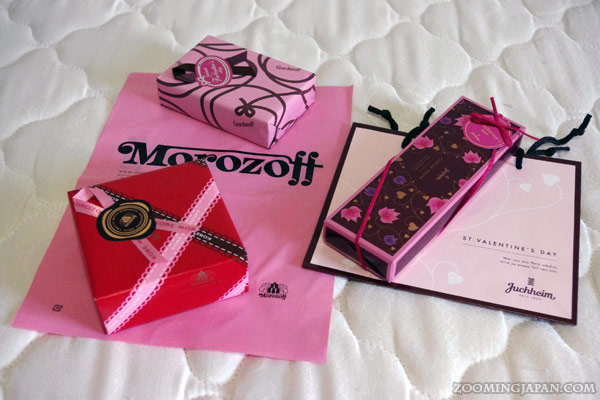On February 14th we celebrate Valentine’s Day – also here in Japan!
However, Valentine’s Day in Japan might be different from what you are used to.
First of all, it’s a Western “holiday” that Japan adopted and modified – similar to Christmas.
I’m mainly going to tell you from my own experience. I’ve experienced 7 Valentine’s Days in Japan. I don’t know if there are regional differences, but I doubt it.
Valentine`s Day is the day for lovers. You give your beloved ones something to show them that you care about them.
So far so good. That’s not really different in Japan! But what is different then? Read on to find out.
1. What is given on Valentine’s Day in Japan?
Chocolates. Period.
Valentine’s Day in Japan is a big commercialized event.
Around the beginning of February, basically as soon as “Bean Throwing Day” is over, you’ll see tons of chocolates in boxes everywhere!

They range from very cheap (~300 yen / ~4$ US) to super expensive (~5000+ yen / ~65$ US).
There are a lot of brand names, there’s gold leave decoration and more.
It’s up to you what you buy, but it also depends on whom you’re giving it to (see next point).
2. Who gives? Who receives?
The basic rule is that the woman gives something to the man.
However, Valentine’s Day in Japan is not only a day for lovers.
So, almost every woman / girl has to give something on Valentine’s Day!
If you don’t have a boyfriend / husband to whom are you giving it then?
Especially among students it’s very common that you give something in order to confess your feelings to somebody.
In that case, we’re talking about self-made chocolate. Usually you wouldn’t buy chocolate to confess your feelings!
Or, in other words, if you want to show you really like someone (your boyfriend / husband / crush), then you give them “honmei choco” (本命チョコ, “really mean it chocolate“).
Opposed to that there’s something called “giri choco” (義理チョコ) which literally means “duty chocolate” – and that’s exactly what it is.
I have no idea who came up with this stupid idea, but you’ll come across the “duty” thing in many other Japanese customs (e.g. “Japanese New Year Cards“). ![]()
I’m pretty sure that you’ve seen that in various manga or anime. There, Valentine’s Day is a really popular theme.
Maybe somebody felt sorry for all the guys who didn’t receive any chocolate on that day. Imagine you’re at your workplace and all the guys get chocolate, but you! Wouldn’t you feel miserable?
Solution: duty chocolate! Tadaaa!~
Well, to be honest I think it’s the chocolate industry that came up with the idea to get a lot of money ..
If you work in a big company with a lot of male co-workers, you’ll have to spend a fortune! I saw Japanese office ladies complaining about it a lot!
Luckily I work for a small company with more female than male co-workers.
Advice: To your higher-ups or your boss you should give a bigger / more expensive box of chocolate.

True fact: Morozoff Ltd. introduced the holiday for the first time in 1936, when it ran an advertisement aimed at foreigners. Later in 1953 it began promoting the giving of heart-shaped chocolates. Then, other Japanese confectionery companies followed suit thereafter.
The custom that only women give chocolates to men appears to have originated from the typo of a chocolate-company executive during the initial campaigns. Chocolate companies make half their annual sales during Valentine’s Day in Japan. (See? Told you! ![]() ) (*source: Wikipedia)
) (*source: Wikipedia)
3. And women don’t get anything? This sucks!
Wait! It’s true that they don’t get anything on Valentine’s Day, but Japan has come up with another “great” idea (read: how to squeeze even more money out of people): “White Day”
White Day is exactly 1 month after Valentine’s Day, on March 14th.
On that day men are supposed to give something in return to all the women who gave them chocolates.
When I first came to Japan I was under the impression that it’s gotta be white chocolate.
It’s not. It’s a small present. It can be anything, really. Often it’s food, snacks or something small and useful (e.g. towels, handkerchiefs, …)
It can be chocolates as well. There’s no rule, really.
Also, recently it has become pretty common to give chocolates to your female friends or classmates on Valentine’s Day in Japan.
I think that’s rather cute as it’s kind of unfair that only the guys get to eat all the delicious chocolate.
That is called “tomo choco” (友チョコ) and just means “friend chocolate“.

“Friend chocolate” I received from female students of mine.
True fact: In the 1980s the Japanese National Confectionery Industry Association launched a successful campaign to make March 14th a “reply day”, where men are expected to return the favor to those who gave them chocolates on Valentine’s Day, calling it White Day for the color of the chocolates being offered. A previous failed attempt to popularize this celebration had been done by a marshmallow manufacturer who wanted men to return marshmallows to women. (*source: Wikipedia)
4. After White Day (March 14), there’s Black Day (April 14)?!
Don’t worry, there is nothing on April 14th .. in Japan!
However, there is an informal custom in South Korea called “Black Day” as opposed to the “White Day”.
South Korea celebrates Valentine’s Day and White Day similar to Japan, but they are nicer to singles! If you didn’t receive or give anything on the previous two dates, then you can come together with single friends on April 14th to eat Korean noodles with black bean sauce called Jajangmyeon.
Black Day is not a bad day at all. It’s for celebrating your singledom!
I vote for adopting this event in Japan as well! ![]()
Have you ever given or received “love chocolate”?
I never have. I have given “duty chocolate” and received “duty presents” in return many times, though.
At first you think it’s kind of cute and you might even be embarrassed to give chocolates to your male co-workers. I made the mistake to emphasize that it’s ONLY “duty” chocolate, but that’s considered to be rude, obviously.
I just wanted to make sure that there are no misunderstandings! ![]()
After a few years it gets annoying. Why should you give something to people you don’t really care about all that much? Why spend a lot of money? ![]()









“It was interesting reading all the other posts about Valentine’s Day. Make sure to check them out!
Thanks for reading!~ ”
LOL!
I musta lost your comment in the …or wait? You didn’t leave one? Thanks for doing one of the 50 or so “How Valentines is celebrated in Japan” posts…..seriously….no one woulda known…..
Your site is gorgeous and your content is excruciatingly common. Congrats and my condolences.
Hello Chris,
you seem to be offended that I didn’t leave a comment in your blog?
I usually don’t comment EVERYTHING. Your blog is definitely pretty “special” and it’s not really “my world”.
See? You don’t seem to like what I write here, then it’s ok if you don’t write a comment.
Nobody forces you to read something you don’t like. If you don’t like it, just ignore it.
Give that freedom to other people as well, will you?
Yeah, it seems every year I get a selection of choco, ranging from giri to honmei. I keep telling them I’d rather get onigiri, but to date I have received zero heart-shaped rice balls.
As for tomo-choco, I think of it as somewhere between giri and honmei. That is, girls can give guys chocolates just out of friendship, not because they have to, but also not because they’re in love either. It’s just something nice to do.
Happy Valentine’s Day, and p.s., thanks for visiting my site!
Ken
Heart shaped rice balls, huh? Nice idea, though. And definitely healthier than all that chocolate!
Yes, “tomo choco” is definitely a nice idea (and the only way for me to get some chocolate on Valentine’s Day :sweatdrop2: ).
I hope you had a nice Valentine’s Day. Thanks for your comment! :D
What a fantastic, detailed post! (^_^)v
Thanks for reading! I hope you had a nice VD?! :D :hearts:
Valentine’s Day in Japan is too complicated for me (sounds stressful!). Glad I live in the U.S. for this holiday :fan: Great post!
It can be quite complicated and expensive.
White Day is not better as the guys have to figure out how expensive the chocolate they received was and then need to come up with a good “reply present” of equal value.
“Tomo choco”, friends chocolate is a nice idea, though.
Thanks for your comment! Hope you had a nice VD! :D
When I lived in France I heard of Valentine’s Day, but it isn’t a popular custom. Now that I am in the States, I have grown to just hate those red heart shaped boxes. The chocolate in them is usually vile…
Gift giving is probably something you have to budget for in Japan: Valentine’s Day, New Year, omiyage, wedding presents, etc., etc.
In the drama Haken no Hinkaku there was an amusing passage where the young woman charged with calling out the shoppers attention to those chocolates forgets herself and starts questioning the “silly custom”, causing all the temps to leave and the other “office ladies” to question the gesture.
Thanks for an informative post [as usual!]
To be honest I think VD is not such a big deal in Germany either. It’s just important for a small group of people (those who have a partner) – and even among them they don’t all “celebrate it”.
If you want to, you could just ignore that day. I guess that’s impossible here in Japan.
You are totally right! When visiting somebody, omiyage, weddings, if you drop out or quit somewhere, various holidays etc. … all those are occasions that will make you poor! :(
I don’t know that drama (yet), but it sounds very interesting. Thanks for sharing! I will have a look at it. :thumbup:
I really want to experience Valentine’s day in Japan, as last time I experienced White Day when I visited and found out why I saw so many hearts.
Valentine’s Day for a guy in Japan can either be great or horrible.
When I asked my elementary kids (boys) how much chocolate they received, they were all moody and said that VD is not a good day! :hihi:
Unfortunately this continues until much later. I guess married guys don’t care much anymore and just enjoy all the “giri” choco they get at work.
Great post! I especially enjoyed reading about something new in “Black Day”. Thanks for sharing!
I found out about that day a few years ago as one of my Korean readers told me about it. Quite interesting.
I think a lot of people are only giving giri-choco today! I received a couple tomo-choco today, though. :mukatsuku:
Happy Valentine’s day~
I got some tomo choco as well, but I had to beg for it (being female and all ..) :peace: :sweatdrop2:
One of my school principals (female) gave me a brownie at work, so I’m not complaining ;)
I didn’t give chocolate to anyone this year. Once at my old job I took the trouble of making chocolate covered cookies and whatnot and doling them out at all of the schools where I worked. But realistically as I work at 3 schools now which each have between 20 and 50 employees, buying chocolates for all the men would be simply ridiculous!! As would making them. But if I worked for a small company I might do it.
I’m so glad my boyfriend is not Japanese because I would get too nervous about things like this.
I’d never heard of Black Day before, that seems interesting!
I guess if your workplace is ridiculously big, then you’re not required to give chocolates to everybody. I’m sure there are certain rules again whom you should give some nevertheless in that case.
Did other female Japanese staff at your schools give chocolate to their male co-workers?
I honestly didn’t hear anything about it! And on Valentines I was teaching all class periods in the English room so I never saw anything special going on in the staff room, either.
Ich habe gerade dein Blog entdeckt! Ich bin eine 27-jährige Belgierin und einen riesigen Japanfan! Ausserdem habe ich Germanistik studiert – Deutsch ist meine Lieblingssprache -; das Blog einer Deutschen über Japan ist also eine perfekte Kombination für mich! Nächsten Sommer, im Juli, werde ich, zusammen mit meinem Freund, Japan zum 2. Mal besuchen. Das erste Mal waren wir aber nur 4 Tage in Japan (kurzen Ausflug aus Süd-Korea), ich freue mich also riesig, um Japan besser kennenzulernen. Da ich mich noch nicht so gut mit Japan auskenne, finde ich dein Blog sehr interessant – ich werde am Wochenende mal versuchen dein Blog ganz durchzulesen. Ich erkenne viele der Gefühle, die du über Japan schreibst; ich sage immer, dass ich im falschen Kontinent geboren worden bin und, dass ich heimlich eine Japanerin bin :) Dein Bericht über Valentine’s Day war schon recht interessant!
Und ausserdem liebe ich auch Katzen! Du hast wirklich das perfekte Blog für mich :)
Grüsse aus Brüssel
Hallo Leila!
Wow, dein Deutsch ist ja wirklich wahnsinnig gut! Respekt! :D
Vielen Dank für den lieben Kommentar!
Ich hoffe, du hast nochmal Gelegenheit demnächst nach Japan zu kommen. :thumbup:
バレンタインデーは、最早、自分のためにだけチョコを買うためにあります
そうですか。いったいどういう意味でしょうか。
誰が自分のために買うのかな。もしかして、女性はホワイトデーのチョコを期待していながら、チョコをあげますかな。
本当によく分かりません。もし良かったら、言いたかったことを教えてくださいね。 ;P
日本語って主語を飛ばすから分かり難いよね、ごめんね:teary:
私にとって、です。
バレンタインデーシーズン(1月末頃〜2月14日)には、
日本には、世界から、
たくさんのおいしいチョコレート・珍しいチョコレートがやってきます。
この期間しか買えないチョコレートが、たくさん集まるのです。
私は、チョコレートが好きなので、
毎年、美味しいチョコをたくさん買います。
今年も自分のためだけに、¥5000位買いました。
日本では、お菓子屋さんの陰謀で、
1960年代頃から、
女性がチョコレートを添えて愛を告白する日
というのが定着してきましたが、
誰にも、愛を告白せず、家族にも分けず :hihi:
自分だけでチョコレートを楽しむ日(期間)となりました
という意味です
昔は、殿方に差し上げてました
ええ、ホワイトデーのお返しは3倍返しでね、と言いつつ
なるほど! :thumbup:
短期間だけ、高品質のチョコレートがたくさんあって、自分のためにも買いたいと思っていますね。 :hihi:
分かりますよ!
今までは、自分のためにチョコレートを買いませんでした!今回はぜひ買います!!! :happy:
ところで、日本ではチョコレートは数えられる名詞なので :thumbup:
重さではなく、一粒いくらで売っています :sweatdrop2:
私が好きなのは、だいたい210円から350円位と高価なので、
あまりたくさんは買えません。
そうですか。面白いですね! :sparkling:
ちょっとだけ食べてみたいなら、小さくて安いのチョコレートの方が良いでしょうね。www :hihi:
Hi, how r u doing?
I’m fine because it is holiday today. :)
You seem to be popular with your school. ;)
Because you got some chocolates!
Btw, I gave a little expensive chocolate to my piano teacher.
When I handed him it, he said to me, “Is this a chocolate for your favorite?”
I answered, “No! Just a Chocolate Diplomacy.”
To my surprised, he was smiling and seemed to believe that I love him. :(
omg!
Hello! :D
Thank you very much for your comment!
I’m not popular! I had to force the students to give me some chocolate!! :present: :peace: :hihi:
Really?? Oh no! What a misunderstanding!! :sweatdrop2:
My post V day comment. :(
I don’t give chocolates to my superiors or male coworkers on Valentine’s Day, not once since I came to Japan. I gave chocolates to our parish priest but it’s more of like a birthday present coz the next day is his birthday and he likes chocolates. I gave some of my female coworkers, too.
I don’t know if it’s rude not to give to my superiors but I don’t feel like doing it (and I don’t want to spend too much on those giri chocolates) =P
I wish there’s Black Day here in Japan, too. I’ll be looking forward to celebrate it. :)
Well, I’m the only foreign female at my workplace.
Of course all the Japanese females are giving something, so …. it’s peer pressure, maybe?
Ahaha. :shiawase: :sweatdrop2:
But like I said it’s a small company, so it’s actually not really a burden or anything.
This year kinda sucks, because I won’t get anything in return on “White Day” as I’ll already have left by then! :(
:D netter Artikel!
Habe ja auch auf meinem Blog reichlich Senf dazu geschrieben..
Die letzten Jahre habe ich zum Valentinstag selber Pralinen gemacht und meinem Freund geschickt, dieses Jahr vorerst nur eine Karte denn wir sehen uns bald – und frisch schmeckt so nen Zeugs einfach viel besser! Am White Day gab es für mich bisher immer unterschiedliche kleine Überraschungen, daher bin ich auf dieses Jahr gespannt. Für mich Schokoholic wird aber auf jeden Fall was Süßes dabei sein. :shiawase:
Kurzzeitig war ich am überlegen, meinen Chefs auch Giri-choco zukommen zu lassen, aber da hätte das Porto dann weit mehr gekostet als die Schokolade – somit müssen sie sich gedulden bis ich endlich in Japan sesshaft werde ;P